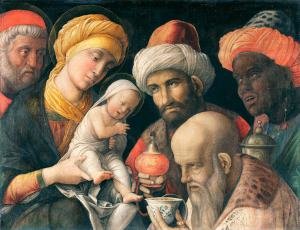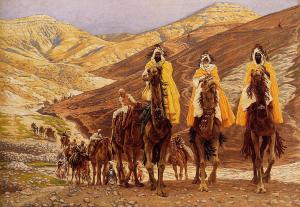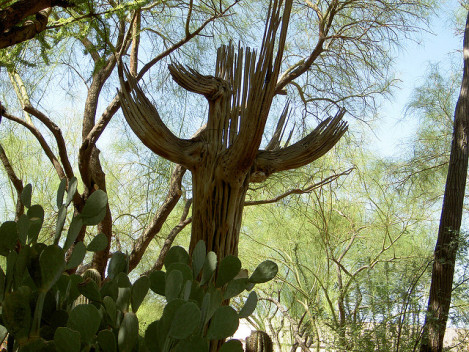God’s people at The First U.P. Church of Crafton Heights joined the church around the world in observing the Epiphany of Our Lord in our worship January 7 (a day late, perhaps, but the attendance was better than it would have been on Saturday…). The readings for the day included Matthew’s account of the visit of the Magi as well as Isaiah 60:1-6.
To hear this sermon as preached in worship, please use the media player below…
https://castyournet.files.wordpress.com/2018/01/sermon01-07-2018.mp3Let me start off by affirming that I like – no, I love – babies. I’ll hold babies. I’ll change babies. I’ll coo and ooh and ahh over babies. Some of my favorite people are babies. Heck, I was a baby. I like babies.
Having said that, I need to confess how deeply I hate baby showers. That whole process is painful to me… playing cute games…watching people unwrap gifts which are either profoundly practical, yet dull (ooooh, a dozen diapers!), or wildly entertaining but not necessarily helpful (like the baby poop alarm that slides into the diaper). I don’t like watching people pretend that they don’t already have four other Bumpo seats while they are unwrapping the one I got for them. So, yeah, I’m not a fan of the Baby Shower.

Adoration of the Magi, Andrea Mantegna (c. 1500)
But imagine if you could have been a fly on the wall the day that the Magi came to visit the Holy Family. Can you imagine reading Mary and Joseph’s faces as they unwrap the presents that came in that day?
“Hmmmm… what could it be? Oh, look, Joseph! It’s gold! What a nice gift – I’m sure that will come in handy in the days ahead…” So far, so good.
“OK, Mary, what’s in that one? Frankincense? Um, thanks. I’m sure that, you know, when he’s older, he’ll really like burning this and smelling the, you know, good smell. When it’s on fire. So, we’ll just hold onto it for him for the next decade or so…”
And finally, “Ooooh, golly! Myrrh! What young family wouldn’t be thrilled to get the gift of embalming fluid at a time like this! Thank you so much…”
Frankincense and myrrh. Two of the least practical baby gifts in the history of baby gifts.
And yet, the Magi not only gave them to Jesus, but this is one of only two stories that Matthew chooses to tell us about Jesus’ infancy and childhood. Why would that be so? Why did they give those gifts, and why do we need to know about them?
Willie Sutton was a notorious bank robber in the middle of the last century. According to legend, one reporter asked him, “Willie, why do you rob banks?” His answer was simply, “Because that’s where they keep the money.”
Why did the Magi leave gold, frankincense, and myrrh? Because that’s what they had. OK, but why did they have it?
Well, for starters, they had that stuff with them that day because they’d been intentional. They had brought it from home, hoping to meet a king, hoping for a chance to honor that king, and hoping for the opportunity to present gifts signifying wealth and power to that king.
More to my point, I would emphasize that they still had the gold, frankincense, and myrrh. That is to say, they had it on the day that they met Jesus because they didn’t give it to anyone else along the way. Which is, when you stop to think about it, fairly remarkable. They’d come to Israel seeking a king. And they’d already met a king – his name was Herod. When they showed up in the country where they thought that the king would be, they did what you or I might do – they looked in the palace for the king. And yet when the got to that palace, and they met that king, they chose NOT to give Herod the gold, frankincense, or myrrh. They might have left a few other trinkets or hospitality gifts, but they opted not to leave the “real” gift with him.

Journey of the Magi, James Tissot (c. 1894)
And we might say, “OK, they gave the baby gold, frankincense, and myrrh because they happened to have them on hand, but presumably they had a lot of other things on hand, too.” In all probability they had camels and servants and scrolls and granola bars and license plate bingo games (ok, I’m not sure about those last two; I’m just inferring from when my family takes long trips…). When they got to the house and they saw that the king was only a baby, why did they follow through on their plan to offer those things to Jesus?
On the one hand, we could say that gold, frankincense, and myrrh were gifts that symbolized honor and worship. That’s why they left home; that’s what they came to do; and that’s what they did. The visit wasn’t so much about providing the new king with tools that would equip him for his reign as it was about making a statement as to what they thought of him and his role in the world.
And on the other hand, we could say that they really had no idea what they were doing in presenting those gifts to the child. The author of Matthew used this event, in a broad way, to symbolize the fact that in the years ahead, Jesus would be rejected by those who ought to have known better and at the same time his message would find widespread acceptance by those who for centuries had stood on the outside looking in. There’s no way that the Magi could have known the impact that their visit would have so many years after it occurred.
At the risk of overstating the obvious, I will point out that there are, to my knowledge, no near-eastern mystics, astrologers, or potentates in the room this morning. And I will go out on a limb and predict that when it’s time to receive the morning offering, the plates will come back up front with some cash and a few checks inside, but there will be no bullion, no incense, and no embalming fluid in this morning’s collection.
[3]And yet, each of you is from somewhere, and you are someone, and you have something…which means that every person in this room faces some level of choice which is not altogether different from that with which the Magi dealt so many years ago. Each one of us left home on Monday carrying the promise of 168 hours in this week. Every single person in this room can choose to invest energy into relationships and the lives of other people. We all have some level of opportunity connected with our financial situation. I understand that nobody has unbridled control over every aspect of their lives, but I am here to suggest that how you decide to allocate those resources over which you do have control says a great deal about yourself and your value system.
I suspect that for the first wise men, and for us, the temptation might be to look at those items of value we’ve received – our treasure, our time, our skills – and be tempted to simply leave them at home. We don’t want to use them, we aren’t interested in giving them away, so why bother carting them around?
Then again, we could all simply hand that stuff over to whoever passes for Herod in our own lives. We could show up at the place that symbolizes power and majesty and fame and offer the best that we carry there.
But I am here to say that offering my self – time and energy and finances – in the service of Christ has been a source of deep blessing for me.
And I’m also here to say that some of the things that you and I have done in our lives that have had the deepest and longest-lasting impact on ourselves, our neighbors, and our world have been done in sheer ignorance of their impact. We had no idea that the little thing we did affected someone so profoundly. We couldn’t see it coming any more than the Magi saw themselves as agents of God’s working in and through different cultures in the world. We had a nudge, we felt a little prompting, and so we gave, or we served, or we acted like a friend to someone… and the world changed a little bit.
And all of that leads me to my absolute favorite aspect of the whole story from Matthew: the last phrase in this morning’s narrative. In the midst of all the details about the visit of the Magi, the author makes sure that we know that these travelers “…returned to their country by another route.”

Three Wise Men Watercolor 4, Niall Drew (2014) Used by permission. For more, see http://nialldrew.com
Now that could mean simply that they chose an alternate route home. They went by boat over the Sea of Galilee, or they took route 80 instead of the turnpike. It certainly means that they decided not to go back to Herod and fill him in on their visit to Bethlehem. While both of those things could be true, I choose to add my own interpretation as well: that these mystics returned to their point of departure having been changed by the travel they’d shared.
That is the power of a pilgrimage. They went on a trip, and the things that they saw, and did, and heard affected them to the core of their being. Coming up against the power of Herod, the act of giving gifts to the Holy Family, and their encounter with the Christ child all led them to redefine themselves in such a way as to ensure that none of the days that followed were as they might have been otherwise.
You know this. You’ve been on a pilgrimage, I suspect. I’m certain that when I use this word, some of you reflect immediately on that time when you had a huge, once-in-a-lifetime trip. It was a mission trip to somewhere far away, or you visited the Holy Land or the Vatican, and you knew, even as you were preparing for the journey, that it would be powerful. You hoped for it. You planned for it. And it changed you.
And others, I hope, will think a little deeper. You’ll remember the day that the pastor called you to go and visit the hospital, but the day that you got there, the patient asked you to help her die. You were invited to a Youth Group retreat, and while you were there, something just clicked. You asked a friend have a coffee or a beer with you, and you wound up hearing for the first time the story of his failed marriage. In other words, there have been times when you didn’t know something was going to happen, but you found that you were changed anyway. You thought you were doing something that required a few steps or a couple of minutes but discovered that you were in the midst of a journey that affected you in a profound way. You didn’t know it then, but you can point to it now.
That is the essence of a pilgrimage – whether you’re an astronomer 2000 years ago or a soccer mom today, a pilgrimage is accepting the invitation to a journey that results in change. My call for today, and the invitation I put forward this morning, is for each of us to consider 2018 as a year of pilgrimage. As you consider the year that lies ahead, can you ask yourself, “What next?”
Everybody in this room stands at the door right before you walk out of the house, and you say, “OK, do I have my wallet? My keys? My phone?” Let me encourage you to adopt this as more than a pragmatic ritual. Think about what you have when you answer the phone, or leave the house, or open your email. Think about how you steward the resources at your disposal, and what you think of as “yours” as opposed to what you think of as something to share.
Look for ways to engage with others in the pilgrimage that is worship, and ask for God to change you in and through that worship experience so that you, no less than the wise men of old, might be changed for having encountered the Christ – and that therefore you, too, can go home by another way.
The opportunity for such an encounter stands before you this day. Thanks be to God for the privilege of saying “yes”. Amen.
Share this:




